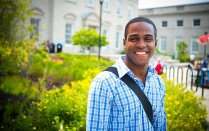Campus News
SUNY award to support 14 underrepresented faculty
By SUE WUETCHER
Published December 17, 2019 This content is archived.
SUNY is supporting UB’s efforts to foster diversity and inclusion on campus with a $2.2 million award over three years for 14 new tenure and tenure-track underrepresented minority and women faculty members, Interim Provost A. Scott Weber told the UB Council at Monday’s meeting.
The award is from the first round of funding through SUNY’s PRODiG program.
PRODiG (Promoting Recruitment, Opportunity, Diversity, Inclusion and Growth), which Chancellor Kristina Johnson announced in her 2019 State of the System address, aims to increase the representation of historically underrepresented faculty at SUNY, including underrepresented minority faculty and female faculty of all races in STEM fields.
UB will request salary support for eligible hires made every academic year through 2023-24, or as long as the PRODiG program is in place.
Through PRODiG, SUNY also plans to provide one-time graduate research stipends for diverse incoming PhD students, Weber said.
“For the past 10 years, UB has had significant success in diversifying its student body; approximately half of UB’s student body is comprised of minority and international students,” Weber said.
However, in keeping with national trends, UB has faced challenges recruiting and retaining underrepresented faculty, he said.
“With growing numbers of underrepresented minority students at UB, it is important for their inclusion and success that they see themselves reflected in their faculty mentors and role models.”
Weber noted that UB has a variety of efforts underway to enhance recruitment and retention efforts that significantly diversify the faculty, among them integrating best practices for diverse faculty searches, providing online training for search committees, building diverse recruitment networks, and providing excellent mentorship and professional development programs for faculty.
“This is particularly important as underrepresented minorities make up less than 10% of the national labor force for full-time faculty positions,” he said.
In other business at Monday’s meeting, President Satish K. Tripathi offered council members a “shortened” version of his State of the University Address. He cited accomplishments in UB’s undergraduate and graduate programs, faculty teaching and scholarship, climate action and living and learning spaces.
Tripathi then turned to the question: “What is next?”
“2020 for us has been a vision, not a date,” he told council members. Tripathi noted that in the past eight years, UB has risen in the ranks from about 60 to 31 in the most recent U.S. News and World Report and Wall Street Journal/Times Higher Education rankings.
“It’s not easy to do it, but with the right kind of planning, the right faculty and students, and providing the opportunities for research and education, we have been able to achieve that,” he said. “We actually have a lot more potential,” he said, adding that UB’s aspiration now is to be among the top 25 public research universities in the country, which he called “a bold, but achievable ambition.”
“And considering our trajectory, the next natural phase of the evolution is to go in that direction,” he said.
“We’ll continue to follow the guiding principles of UB 2020, but hone the articulation of these goals.”
There are challenges, Tripathi admitted, including continuing flat state appropriations, a declining high school cohort, a reluctance of international students to study in the U.S. and questions about the value of higher education.
“Fifteen years ago, UB was a very good institution with great potential,” he said. “Today, UB’s transformed in our research and our academic enterprise, built environments and engagement in the community. The potential for our university is truly limitless.
“It’s truly exciting to embark on a new chapter for UB,” he said. “The success of our Top 25 ambition hinges on all of us. If we pursue our goal together, there is nothing we cannot achieve.”
In other action at Monday’s meeting:
- The council unanimously approved resolutions naming the Frank H. Clement and Marilyn D. Clement Professor of Health Care Innovation in the School of Management and the Linda Edelman Chair in Pharmacy Practice in the School of Pharmacy and Pharmaceutical Sciences.
Both the Clements and Edelman donated $1 million to endow their respective faculty positions. Rodney M. Grabowski, vice president for philanthropy and alumni engagement, said Edelman’s endowment will grow to $1.5 million through the SUNY Scholars of Excellence program, noting this is the first match of a UB endowed chair under the SUNY Chancellor’s new guidelines, announced earlier this year.
Under those guidelines, Grabowski explained, donors can establish an endowed chair with two-thirds of the total amount typically required to do so, with the remaining one-third coming through annual reinvestment of the earnings to accelerate the endowment fund’s growth. During the accelerated growth period, the SUNY chancellor pays the operating income to the university, he said.
- President Satish K. Tripathi said he expects to choose a new provost by the middle of January. The five finalists for the position — including Weber — traveled to campus during the past two weeks for interviews and to meet with UB stakeholders.
- Tripathi also updated council members on the national search for a new dean for the School of Engineering and Applied Sciences. He said he expects finalists to visit for on-campus interviews in March. The search has been intentionally slowed down so that a new provost could be in place to select the new dean, he said.
- Tripathi welcomed new council member Brenda McDuffie. McDuffie, who is stepping down next year as president and CEO of the Buffalo Urban League, was appointed to the council by Gov. Andrew M. Cuomo.
